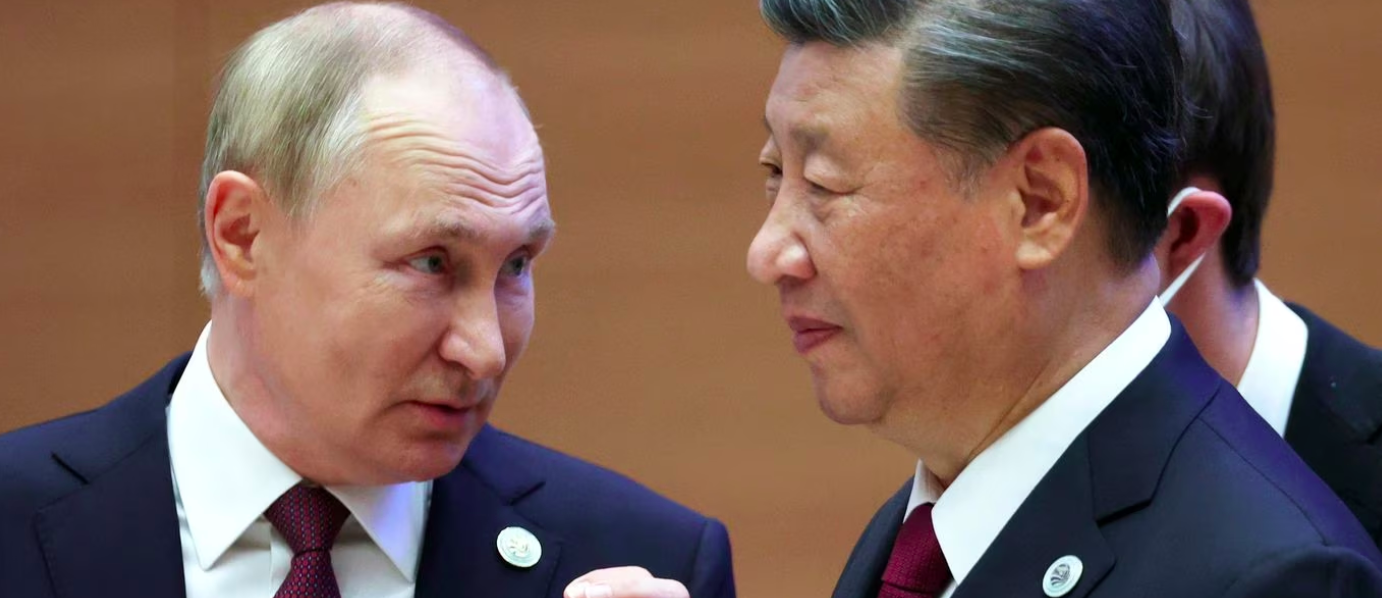China’s President Xi Jinping will visit Russia next week, the first since Russian President Vladimir Putin invaded Ukraine.
Analysts say the visit is an unmistakable sign of support for Russia amid the War in Ukraine and rising tensions with the West over the two countries.
The visit will occur between Monday (20) and Wednesday (22).
Russia announced that the visit was “at the invitation of Vladimir Putin.”

The trip will be Xi’s first abroad since securing a third term as China’s president.
It will also be the first time Xi will visit Putin, the man he has previously described as his “best friend” since Russia invaded Ukraine last year.
Before the trip was confirmed, the Wall Street Journal reported that Xi was expected to speak by phone with Ukrainian President Volodymyr Zelensky in his first conversation with Ukraine’s leader since the conflict began.
A Ukrainian presidential spokesman said Friday that the matter is under discussion.
China has declared a “boundless” friendship with Russia and refused to condemn Moscow’s invasion, even though it declared that all countries’ sovereignty and territorial integrity should be respected.
Beijing also condemned Western sanctions and accused NATO, the Western military alliance, and the United States of provoking Russia.
Xi last visited Russia in 2019.
Putin attended the Winter Olympics opening in Beijing last year, and the two leaders met in person at a regional security summit last September in Uzbekistan.
Putin invited Xi to visit Russia during a video conference held in late December.
The visit, Putin said, could “demonstrate to the whole world the strength of Russian-Chinese ties” and “become the main political event of the year in bilateral relations.”
In addition to “boundless friendship,” the West suspects China may plan to send weapons to support Russia.
Intelligence agencies in the United States and Europe said in February that they had clear indications that Xi Jinping was planning to provide military support to Putin, which would be an appropriate step in escalating the War in Ukraine. Beijing denies this.
China has sought to portray itself as a neutral actor in the conflict.
However, its position has been criticized by Western leaders who believe that the Asian country is supporting Russia.
The invasion seemed to take China by surprise, and since then, Xi has tried to play the role of mediator while supporting Putin in international forums.
China has blocked G20 statements condemning the war and has abstained from voting at the UN on the same issue.
In a 12-point document issued last month and propagandized as a peace plan to end the War in Ukraine, China called for “dialogue and respect for the territorial integrity” of all countries. Still, Western leaders widely criticized the document for lacking concrete plans and avoiding demands that could harm China’s close ties with Russia.
Xi had sought to polish his image as a global statesman, particularly last week when Beijing negotiated a surprise deal to restore diplomatic relations between Saudi Arabia and Iran.
That agreement came after extensive talks in which both sides were willing to strengthen their ties.
The camera on a US drone shows the moment when Russian jet approaches and sprays a liquid against the aircraft.
Mediating peace would be a much more significant challenge.
Ukraine and Russia remain locked in a war in which neither side seems willing to negotiate an end to the fighting.
In an interview with the BBC, before the visit was announced, Ukrainian Foreign Minister Dmitro Kuleba said:
“I don’t think China has reached the point where it wants to arm Russia. Nor do I think this visit will result in peace… The visit to Moscow is a message, but I don’t think it will have immediate consequences.”
The message, Kuleba said, was “that China and Russia are very close, close enough for the Chinese leader to visit his Russian counterpart, who is not doing very well.”
“And I think this is the message to the whole world, the West, and more importantly, the non-West, that Russia is not alone, that China is talking to them.”
With information from Estadão

